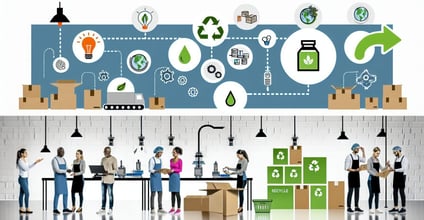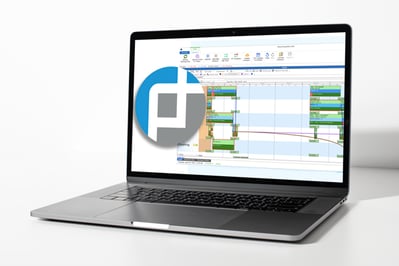Sustainable Packaging Waste Reduction Strategies
In manufacturing, sustainability has emerged as a critical imperative, particularly in industries like packaging manufacturing where environmental concerns loom large. Plant managers in packaging facilities find themselves at the forefront of this sustainability drive, tasked with reducing waste while maintaining efficiency and profitability.
In this era of heightened environmental consciousness, adopting sustainable packaging waste reduction strategies isn't just a moral obligation but also a strategic advantage in a competitive market.
In this blog, we look into the intricacies of sustainable packaging waste reduction strategies, offering insights, best practices, and innovative solutions tailored to the needs of plant managers. Moreover, we explore how integration between advanced planning and scheduling (APS) solutions like PlanetTogether and leading ERP, SCM, and MES systems can amplify the efficacy of these strategies, paving the way for a greener and more sustainable future.

Understanding the Scope of the Challenge
Packaging waste represents a significant environmental burden, contributing to pollution, resource depletion, and ecosystem degradation. The ubiquitous presence of single-use plastics and non-recyclable materials exacerbates this problem, necessitating urgent action.
Plant managers face a dual challenge: meeting production targets while minimizing environmental impact. This necessitates a shift from linear, take-make-dispose models to circular paradigms wherein materials are reused, recycled, or composted. Sustainable packaging waste reduction strategies lie at the heart of this transition, offering a pathway towards operational excellence and environmental stewardship.

Key Strategies for Sustainable Packaging Waste Reduction
Material Optimization: One of the most effective ways to reduce packaging waste is by optimizing material usage. This involves employing lightweight materials, redesigning packaging formats to minimize excess material, and embracing eco-friendly alternatives such as biodegradable or compostable packaging.
Recycling Initiatives: Implementing robust recycling programs within the manufacturing facility can significantly reduce waste sent to landfills. Plant managers should partner with recycling vendors to ensure proper segregation, collection, and recycling of materials such as cardboard, paper, plastics, and metals.
Supplier Collaboration: Engaging with suppliers who prioritize sustainable practices can have a ripple effect across the supply chain. Plant managers should work closely with suppliers to source eco-friendly materials, streamline packaging processes, and explore closed-loop systems that facilitate material recovery and reuse.
Lean Manufacturing Principles: Lean manufacturing principles advocate for the elimination of waste in all its forms, including excess inventory, overproduction, and defects. By implementing lean practices such as just-in-time manufacturing, kanban systems, and value stream mapping, plant managers can minimize packaging waste while enhancing operational efficiency.
Product Lifecycle Assessment: Conducting comprehensive lifecycle assessments enables plant managers to identify hotspots of environmental impact throughout the product lifecycle. By quantifying the environmental footprint of packaging materials, production processes, and distribution channels, managers can pinpoint areas for improvement and prioritize sustainable interventions.

Integration of APS with ERP, SCM, and MES Systems
In the quest for sustainable packaging waste reduction, seamless integration between advanced planning and scheduling (APS) solutions like PlanetTogether and enterprise resource planning (ERP), supply chain management (SCM), and manufacturing execution systems (MES) is paramount. This integration unlocks synergies and data-driven insights that optimize production processes, enhance resource efficiency, and minimize waste generation.
Enhanced Visibility: Integration between APS and ERP systems provides real-time visibility into production schedules, inventory levels, and resource allocation. Plant managers can leverage this visibility to optimize production planning, minimize material overstocking, and align production schedules with demand fluctuations, thereby reducing the risk of excess inventory and waste.
Demand Forecasting: By integrating APS with SCM systems, plant managers can improve demand forecasting accuracy, enabling proactive planning and resource allocation. Accurate demand forecasts facilitate just-in-time production, reducing the likelihood of overproduction and excess inventory buildup, while also minimizing packaging waste.
Shop Floor Optimization: Integration between APS and MES systems enables seamless communication between production planning and execution stages. Real-time data exchange facilitates dynamic scheduling adjustments, machine optimization, and preventive maintenance, ensuring smooth operations and minimizing production downtime that could lead to waste generation.
Sustainability Metrics Tracking: Integrated systems enable plant managers to track key sustainability metrics such as waste generation, energy consumption, and carbon emissions across the manufacturing value chain. By collecting and analyzing this data, managers can identify inefficiencies, set targets for improvement, and monitor progress towards sustainability goals.
Continuous Improvement: Integration fosters a culture of continuous improvement by facilitating data-driven decision-making and cross-functional collaboration. Plant managers can leverage insights from APS-ERP-SCM-MES integration to identify bottlenecks, optimize processes, and implement best practices that drive ongoing waste reduction and operational excellence.
Sustainable packaging waste reduction is not just a lofty aspiration but an achievable goal within the grasp of forward-thinking plant managers. By embracing innovative strategies, leveraging advanced technologies, and fostering collaboration across the supply chain, plant managers can lead the charge towards a greener and more sustainable future.
Integration between advanced planning and scheduling solutions like PlanetTogether and leading ERP, SCM, and MES systems is instrumental in unlocking the full potential of sustainable packaging waste reduction strategies. By harnessing the power of data-driven insights, real-time visibility, and cross-functional collaboration, plant managers can drive meaningful change, minimize environmental impact, and build a resilient and sustainable manufacturing ecosystem for generations to come.
Are you ready to take your manufacturing operations to the next level? Contact us today to learn more about how PlanetTogether and integrated scheduling solutions can help you achieve your sustainability goals and drive success in the packaging industry.
Topics: Demand Forecasting, PlanetTogether Software, Integrating PlanetTogether, Continuous Improvement, Enhanced Visibility, Shop Floor Optimization, Sustainability Metrics Tracking, Waste Reduction Strategies, Packaging Manufacturing




















LEAVE A COMMENT